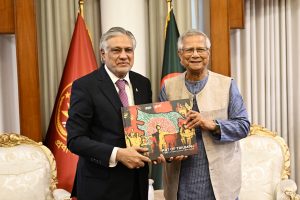Pakistan has described Foreign Minister Ishaq Dar’s visit to Bangladesh on August 23 as a “historic” and “significant milestone” in bilateral relations, as the two South Asian nations aim to reset ties amid Dhaka’s strained relationship with India. This was the first high-level engagement between the two countries since former Foreign Minister Hina Rabbani Khar’s brief stop at Dhaka in 2012.
Many in Pakistan’s policymaking circles have hailed the two neighbors, who were long separated by their painful past, for finally sitting down to talk after years of silence.
There is visible optimism in Pakistan, as the country expects this visit to lay the groundwork for sustainable and lasting cooperation between the two nations. This high-level entente, amid ongoing regional realignments, underscores a historic shift toward mutual progress, which is driven by shared interests rather than lingering grievances between the two sides.
The separation of East Pakistan, which led to the creation of an independent country of Bangladesh in 1971, was a pivotal event in the region’s history. The complicated history stemming from those events has long held back ties between the two countries, despite a lack of other deep-rooted conflicts.
Islamabad has maintained that issues related to Bangladesh’s independence, such as asset division and the repatriation of refugees, have been resolved. Pakistan emphasizes the importance of moving forward and resolving all matters through dialogue. Historically, Bangladesh has insisted on an official apology for the 1971 events and has pushed for talks on asset sharing and to address historical concerns.
The ongoing high-level interactions and eagerness shown by Dhaka and Islamabad indicate that both sides want to focus on the present and move forward, and not dwell on old issues tied to the events of 1971.
Speaking to journalists in Dhaka, Dar said that the issues regarding Bangladesh’s independence were resolved in 1974 and then again in the early 2000s, when then-President Pervez Musharraf visited Bangladesh. Meanwhile, Bangladesh’s Foreign Adviser Touhid Hossain said that any remaining issues from 1971 cannot be resolved in a single day. He indicated that Dhaka is trying to find a way to move forward without raising difficult questions that could cause a deadlock between the two countries.
There are several reasons why Pakistan is optimistic about the evolving relationship with Dhaka.
First, the mood in both capitals indicates that any narrative regarding their difficult past is secondary now, has lost steam, and may not be a political driver for political parties in Bangladesh. There is a visible desire in Bangladesh to shift the narrative regarding Pakistan from the difficult past to a collaborative future.
During Dar’s visit, the two countries finalized six deals, including easier travel for diplomats, media partnerships, and health cooperation. Moreover, new shipping routes and approval of direct flights to both countries demonstrate that both sides are serious about expanding their cooperation.
Second, there is a desire in Pakistan to ensure that the rapprochement benefits all Bangladeshis and not just one political group or party. In the past, Bangladesh’s government under Sheikh Hasina took a clear position of leaning heavily toward India, which limited avenues for broader engagement with Pakistan. Further, under Hasina’s stewardship, the government focused so much on portraying Pakistan as a threat that there weren’t many opportunities for collaboration.
Pakistan appears to be pushing for people-centric relations across all party lines that can stay strong in the long run, no matter who is in charge in Bangladesh. This approach is seemingly gaining support in Bangladesh, where many see Pakistan as a partner to balance regional dynamics. During his visit, Dar met not only the interim government’s Chief Adviser Muhammad Yunus and Foreign Affairs Adviser Touhid Hossain but also leaders from political groups like the Jamaat-e-Islami, Bangladesh Nationalist Party, and the National Citizen Party. These meetings reflect Pakistan’s effort to connect with everyone and ensure ties remain steady through a period of change.
Third, Bangladesh-Pakistan military ties have grown in recent months following high-level visits, a naval exercise, and plans for training programs. In January 2025, a Bangladeshi delegation led by Lt. Gen. S M Kamrul Hassan visited Pakistan’s Air Headquarters and discussed opportunities for joint training. Such cooperation has picked up pace in recent months, particularly after Pakistan’s strong showing in the May 2025 standoff with India bolstered its global reputation. From Pakistan’s perspective, Bangladesh’s defense cooperation with Islamabad signals its confidence in the country’s capabilities and desire to leverage them for mutual benefit.
Notably, in August, the Bangladesh Army’s Quartermaster General, Lt. Gen. Faizur Rahman, visited Pakistan to explore the possibility of purchasing tanks and other weapons from Pakistan’s Heavy Industries Taxila, which is a state-owned firm that manufactures armored vehicles. Similarly, Bangladesh has expressed interest in acquiring Pakistani and Chinese JF-17 Thunder fighter jets to modernize its Air Force as part of the Forces Goal 2030 program.
It is evident that Bangladesh is keen to diversify its security partnerships with countries like Pakistan and China, moving away from relying solely on India. Arguably, enhanced military ties between the Pakistan and Bangladesh militaries could foster interoperability and joint initiatives, which can contribute to stability in South Asia. Moreover, this approach also aligns with Dhaka’s broader engagement with China to potentially form a trilateral axis to balance India’s influence.
Dar’s visit to Bangladesh signals a fresh start between the two countries. It aims to turn a shared past into a foundation for stronger and people-focused ties between two nations that are ready to move forward together.

































